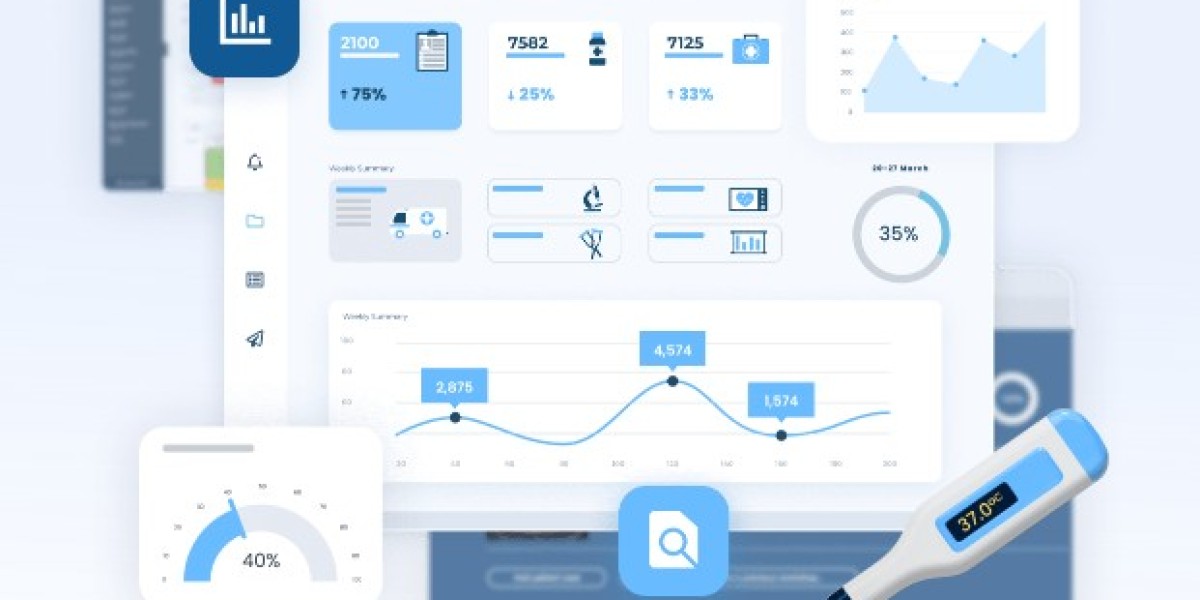The pharmaceutical industry plays a crucial role in healthcare, ensuring that medications are safely and effectively delivered to patients. However, managing the complexities of pharmacy operations can be challenging. Enter pharmacy management software (PMS)—a transformative tool designed to streamline and enhance various pharmacy processes. This article explores the importance of pharmacy management software development, its key features, benefits, and considerations for successful implementation.
Understanding Pharmacy Management Software
Pharmacy management software is an integrated solution that automates and optimizes various functions within a pharmacy. From managing prescriptions to inventory control and billing, PMS enhances operational efficiency, accuracy, and compliance with regulatory standards. The software serves as a centralized platform for pharmacists, technicians, and healthcare providers, facilitating seamless communication and collaboration.
The Need for Pharmacy Management Software
The need for PMS arises from the evolving landscape of the pharmaceutical industry, which is increasingly characterized by:
Regulatory Compliance: Pharmacies are required to adhere to stringent regulations set by government bodies and health organizations. PMS helps ensure compliance with these regulations by automating record-keeping and reporting.
Increasing Prescription Volume: With the growing population and the prevalence of chronic diseases, pharmacies face an increasing volume of prescriptions. Manual processes can lead to errors and inefficiencies, making automation essential.
Patient-Centric Care: Modern pharmacy practices prioritize patient outcomes. PMS enables pharmacists to provide better patient care through enhanced medication management, counseling, and follow-up services.
Technological Advancements: The rapid advancement of technology necessitates the adoption of digital solutions to keep pace with industry changes and consumer expectations.
Key Features of Pharmacy Management Software
A robust pharmacy management system encompasses various features that contribute to its effectiveness. These features may include:
1. Prescription Management
Prescription management is at the core of any pharmacy operation. PMS automates the process of receiving, processing, and dispensing prescriptions, minimizing the risk of errors. Key functionalities include:
Electronic Prescription (eRx) Integration: PMS can integrate with electronic health records (EHR) systems, allowing healthcare providers to send prescriptions directly to the pharmacy.
Refill Management: The software tracks prescription refills and sends reminders to patients and pharmacists, ensuring timely medication adherence.
2. Inventory Management
Effective inventory management is crucial for pharmacies to ensure they have the right medications in stock while minimizing waste. PMS features related to inventory management include:
Real-Time Inventory Tracking: Pharmacies can monitor stock levels in real time, receiving alerts when medications are low or nearing expiration.
Automated Ordering: The system can automate the ordering process by generating purchase orders based on predefined thresholds, reducing the risk of stockouts.
3. Billing and Claims Processing
Streamlining billing and claims processing is essential for the financial health of a pharmacy. PMS features related to billing include:
Insurance Verification: The software can verify insurance coverage in real time, reducing claim rejections and speeding up the reimbursement process.
Patient Billing: PMS allows for easy generation of patient invoices, payment tracking, and managing outstanding balances.
4. Reporting and Analytics
Data-driven decision-making is vital for the success of any pharmacy. PMS provides robust reporting and analytics capabilities, enabling pharmacists to:
Monitor Performance Metrics: Track key performance indicators (KPIs) such as sales, patient demographics, and prescription trends.
Compliance Reporting: Generate reports required for regulatory compliance, ensuring adherence to industry standards.
5. Patient Management
A patient-centric approach is crucial for modern pharmacies. PMS features that enhance patient management include:
Medication Therapy Management (MTM): The software can facilitate MTM programs, allowing pharmacists to review patients’ medications, identify potential issues, and provide counseling.
Patient Communication: PMS often includes tools for sending automated notifications, reminders, and educational materials to patients.
6. Security and Compliance
Given the sensitive nature of patient data, robust security measures are essential. Key security features include:
Data Encryption: Protecting patient information through encryption protocols to ensure confidentiality.
User Access Controls: Implementing role-based access controls to limit data access based on user roles within the pharmacy.
Benefits of Pharmacy Management Software Development
The development and implementation of pharmacy management software offer numerous benefits, including:
1. Enhanced Operational Efficiency
By automating routine tasks such as prescription processing, inventory management, and billing, PMS significantly improves operational efficiency. This allows pharmacy staff to focus on patient care rather than administrative tasks.
2. Improved Accuracy
Automation reduces the risk of human errors associated with manual processes. Accurate prescription processing and inventory management ensure that patients receive the correct medications, enhancing patient safety.
3. Better Patient Care
PMS empowers pharmacists to deliver better patient care through improved medication management, counseling, and follow-up services. The software enables pharmacists to have comprehensive patient profiles at their fingertips, allowing for personalized care.
4. Cost Savings
Although the initial investment in pharmacy management software may be significant, the long-term cost savings can be substantial. Improved efficiency, reduced errors, and streamlined processes lead to lower operational costs and increased profitability.
5. Regulatory Compliance
With built-in compliance features, PMS helps pharmacies adhere to regulatory requirements, reducing the risk of fines and penalties. Automated reporting simplifies the compliance process, ensuring that necessary documentation is always up to date.
6. Scalability
As pharmacies grow, their operational needs evolve. Pharmacy management software is often scalable, allowing businesses to expand their services and functionalities as needed without the need for significant additional investments.
Considerations for Successful Pharmacy Management Software Development
While the benefits of PMS are clear, developing and implementing a successful system requires careful planning and consideration. Key factors include:
1. Identifying Requirements
Pharmacies should conduct a thorough assessment of their needs before selecting or developing PMS. Understanding specific requirements, such as the volume of prescriptions, inventory management needs, and patient demographics, is crucial.
2. User-Friendly Interface
The software should have an intuitive and user-friendly interface to ensure that pharmacy staff can easily navigate and utilize its features. Proper training and support are essential to maximize user adoption.
3. Integration Capabilities
To maximize the effectiveness of pharmacy management software, it should be able to integrate seamlessly with other healthcare systems, such as EHRs and billing software. This interoperability is vital for ensuring smooth data exchange and enhancing collaboration.
4. Customization Options
Every pharmacy is unique, and the software should be customizable to meet specific operational needs. Customization options may include tailored workflows, reporting formats, and user access levels.
5. Data Security Measures
Given the sensitive nature of patient information, robust security measures must be in place. Pharmacies should ensure that the software complies with data protection regulations, such as HIPAA in the United States.
6. Ongoing Support and Maintenance
Software development is an ongoing process, and pharmacies should partner with vendors who offer reliable support and maintenance services. Regular updates, bug fixes, and technical assistance are essential for ensuring optimal performance.
Future Trends in Pharmacy Management Software Development
As technology continues to evolve, pharmacy management software will likely undergo significant changes. Some trends to watch for include:
1. Artificial Intelligence and Machine Learning
AI and machine learning technologies have the potential to revolutionize pharmacy management. These technologies can enhance predictive analytics, optimize inventory management, and improve patient engagement through personalized recommendations.
2. Telepharmacy Integration
The rise of telehealth has led to increased demand for telepharmacy services. Future PMS may integrate telepharmacy capabilities, allowing pharmacists to consult with patients remotely and provide medication counseling via video calls.
3. Blockchain for Data Security
Blockchain technology holds promise for enhancing data security in pharmacy management. By creating a decentralized and tamper-proof ledger, pharmacies can ensure the integrity of patient data and prevent fraud.
4. Mobile Accessibility
With the growing reliance on mobile devices, pharmacy management software will increasingly focus on mobile accessibility. Mobile apps can empower pharmacists to access patient information, manage inventory, and communicate with patients on the go.
5. Advanced Analytics
The demand for data-driven insights will continue to grow. Future PMS may incorporate advanced analytics tools that provide deeper insights into patient behavior, medication adherence, and operational efficiency.
Conclusion
Pharmacy management software development is transforming the pharmaceutical industry by enhancing operational efficiency, improving patient care, and ensuring regulatory compliance. As pharmacies continue to navigate the complexities of the healthcare landscape, the adoption of innovative software solutions will be vital for success. By understanding the key features, benefits, and considerations associated with PMS, pharmacy owners and operators can make informed decisions that positively impact their operations and the health outcomes of their patients.
The future of pharmacy management is bright, with technology playing a pivotal role in reshaping how pharmacies operate and deliver care. Embracing these changes will position pharmacies for success in a rapidly evolving healthcare environment.



